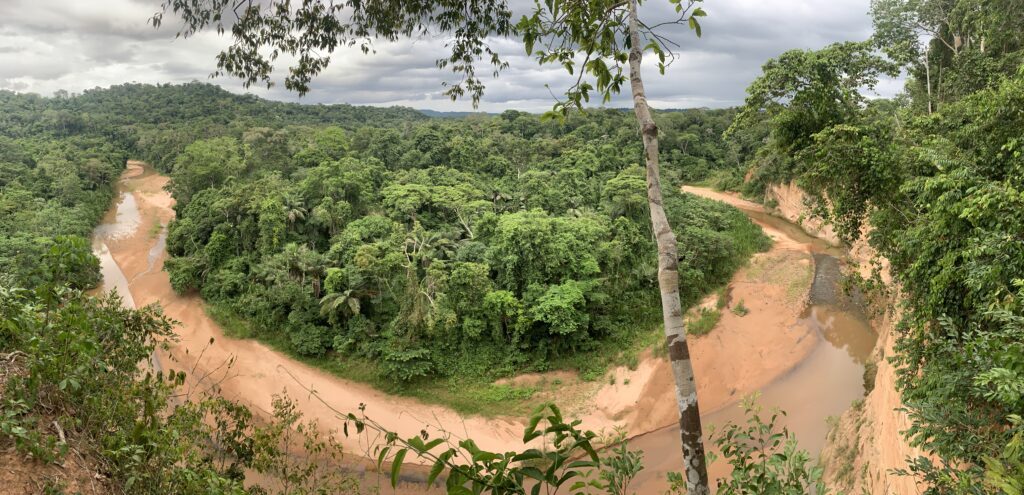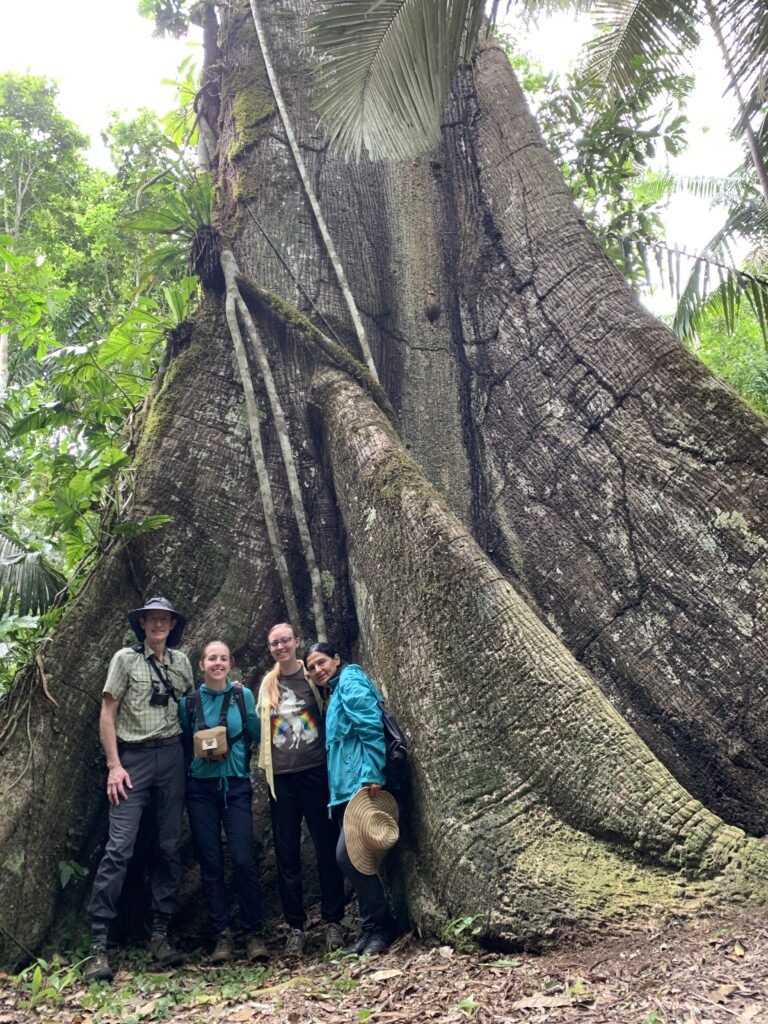
At an overlook down to a tributary of the Tuichi River. We saw black spider monkeys and two kinds of macaws from here.
17 January 2023
Madidi National Park stretches from the Andes mountains to the Amazon basin, and is home to over 1000 species of birds; mammals from shrews to capybaras to monkeys, tapirs, and jaguars; an amazing diversity of magnificent trees and plants; and indigenous communities that have lived here for at least 300 years. It is now facing two existential threats: dam building and gold mining. Given that this is a national park and is protected under the country’s constitution from development, you might think it would be safe from these threats. Given that much of the area under threat is part of several TCOs (territorios communitario de origen, indigenous community territories) and that the constitution guarantees the TCO holders power over what happens inside their land, you might think there could be no threat that wasn’t sanctioned by the indigenous peoples there. In both cases you should be right, but in Bolivia you would be wrong.
This is because, as Senator Cecilia Requena told us in La Paz, Bolivia is a weak democracy without an independent judiciary. This means that whatever President Luis Arce (and before him, Evo Morales) and his MAS party want they can get. Even if it is approving gold mining concessions to Chinese companies in the country’s most biodiverse national park in blatant disregard of the constitution.
We stayed with the Madidi Jungle Lodge for 4 nights and days of rainforest exploration, piranha fishing, tubing down the Tuichi river, and learning from the indigenous guides and visiting community leaders about these threats and the work that each of them have done to resist them. They have spoken passionately and personally about how these threats would impact them. The dam would literally put them and the forest underwater. The gold mining would poison the waterway and the fishes with mercury and rip up the forest and the river banks and bottom. Either or both are an existential threat.
One of the (many) ironies here is that MAS has portrayed itself as pro-environment and pro-indigenous. When Evo Morales (the former president and head of MAS) was first elected, he commanded the support of indigenous peoples from the altiplano to the Amazon basin. Here in Madidi he (and MAS) have clearly lost that support. Talking with our three guides (themselves Tacana-Quechua from local indigenous communities) one night after supper, they expressed extreme disgust for what the national government was trying to do here and despair over how they could stop it. What recourse do a people have when their own government breaks the laws meant to protect them, and then sanctions it? The best we could come up with was a Bolivian standard: publicize it and protest it, and if possible, blockade it.
So far the dams have yet to be built, though the Arce government says it is a priority. So far the gold mining is mostly in the headwaters of the Beni river (we were on the Tuichi river, a tributary of the Beni). But gold fever tends to spread, and proposals have been made to mine the Tuichi as well, leading to massive mercury poisoning of the watershed. (We learned that in the last 5 years, Bolivia has become the third highest importer of mercury in the world, demand driven by the gold mining boom.) If this happens it would be unsafe to eat the fish in the Tuichi. If it happens, huge dredgers would scoop up the lake sediment, or hydraulic sledges would sluice the river banks into slurry. If it happens, ecotourism and the livelihood of all these 17 indigenous communities in and around the Madidi National Park will lose their primary non-extractive source of income. Let’s make sure it doesn’t happen.

A few of us in front of a giant “Mapajo” or Ceiba tree.
[…] this high point, the next day we flew down to Rurrenabaque, Madidi National Park, and the Madidi Jungle Lodge (elevation 800 feet). It was quite a […]